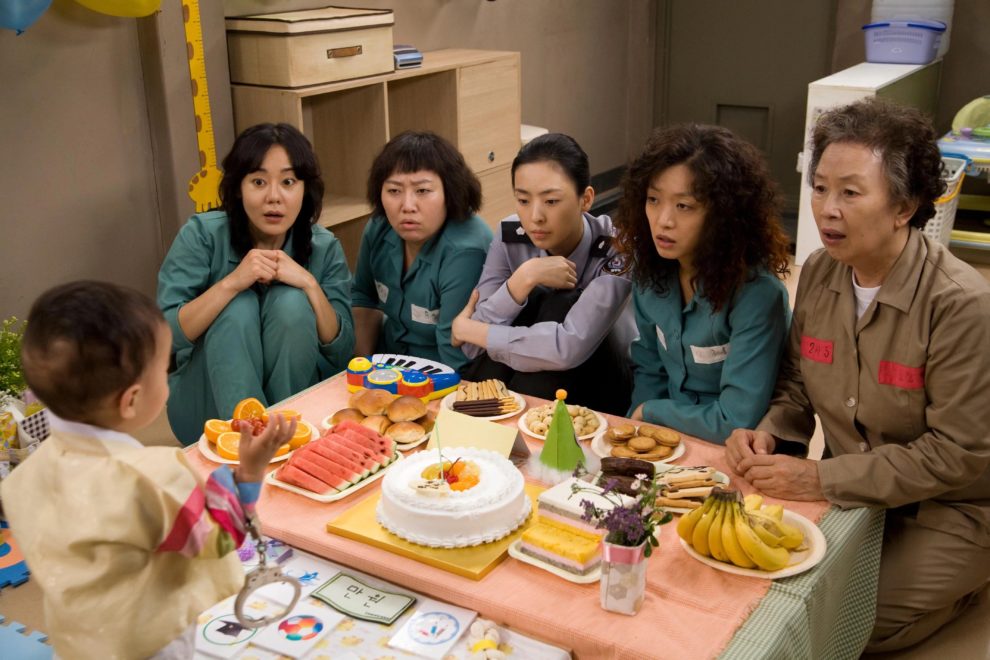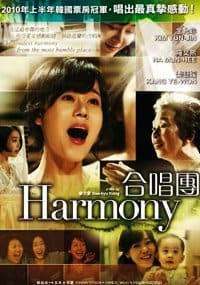Films that have women's prison as their main theme tend to linger towards exploitation; in this case, however, Kang Dae-gyu implements a rather different approach, that includes elements of musical and family drama, all of which though, are presented through a filter made of comedy and a general lightness that evidently focuses mostly on entertainment. The result was quite successful, since the movie was the 5th highest-grossing in the country for 2010.
Buy This Title
The story revolves around Hong Jeong-hye, who is serving 10 years in prison after killing her abusive husband. However, she was pregnant at the time of the crime, and now, 18 months later, she finds herself raising her child in prison, with the help of a number of sympathetic prisoners, and a kind-hearted jailer named Na-yeong. As the time that she has to give the baby for adoption is up, she experiences much stress, and for reasons that are not fully explained in the film, she decides to form a prison choir. Luckily for her, one of her closest friends, elderly Kim Moon-ok was a musical professor at a university, before she got in death row for a crime that is revealed later on. Furthermore, another convict, who has just come in prison and is quite negative and even offensive against everybody, eventually proves to have a great voice. Thus, and after many tribulations, a number of convicts are either convinced or quite eager to participate in the endeavor, and a choir is formed, despite the protests of Section Chief Bang. The problems these women have to face however, are still there, and Jeong-hye not being able to sing is the least of them.
The amalgam Kang Dae-gyu creates here is quite complex, since the seriousness of the main topic is lightened by the musical premises and the many moments of comedy, with him implementing a narrative of episodic nature in order to retain the balance that definitely in its entertainment goals. In that regard, he benefits the most by Shin Min-kyoeng's editing, who both keeps the film flowing through a rather fast pace, and also implements a scene order that forbids the movie from becoming too dramatic or too comedic.
The comments about how these women ended up in prison, with most of them being victims of abusive husbands, the concept of motherhood, female bonding and the way the relationships formed in such a setting can become that of a family, and the topic of the death penalty are all included here, although particularly the last is somewhat misplaced and disconnected, to a point at least. The relationships of the prisoners with their families on the outside are presented through a prism that is both funny and dramatic, with the same applying to the fights that take place inside the prison, which are always depicted through a funny convention, including the music and sound heard during these sequences, and without any sense of brutality. Lastly, the way people perceive prisoners and the racism they have to face on the outside is also here, in one of the most dramatic aspects of the narrative.
The musical element provides even more relief from the drama, with the ensemble choir giving Kang the opportunity for even more hilarious episodes, and a finale that is expectedly spectacular, even involving elements of agony in the way it unfolds.
At the same time, however, and in order to retain this balance, Kang has made a number of concessions, which result in a story that occasionally looks more like a fairy tale than a proper representation of women in prison. The jailer that is too kind, the metastrophe of the Chief Bang, the way the choir is formed among people who were enemies or unwilling to participate, and the conclusions of a number of arcs end up being overly idyllic, and essentially hard to believe.
On the other hand, the charisma and the performances of the protagonists manage to tone down this last aspect quite significantly, particularly to the viewer who focuses on the acting rather than the overall narrative. Kim Yun-jin fills the screen with her presence as Jeong-hye, with her being equally convincing as short-tempered convict, loving mother, struggling singer and compassionate comrade. No Moon-hee as Moon-ok emits a sense of respect with every line through her excellently measured acting. Kang Ye-won as Yoo-mi, Lee Da-hee as Na-yeong and Jang Young-nam as Section Chief conclude the great ensemble in the best way, with the chemistry of the cast being one of the most significant traits here.
Kim Young-ho's cinematography is rather polished, and occasionally unrealistic considering the setting of the film, but at the same time, fits the non-dramatic sequences quite nicely.
“Harmony” manages to present some interesting comments, which, however, remain somewhat unfulfilled, with the movie, essentially, addressing those viewers who focus on the entertainment it offers, and not the serious of its premises. Fun, nevertheless, can be found in abundance here.

















Can they make season 2 of this movie where the boy gets to his real mother & so on..